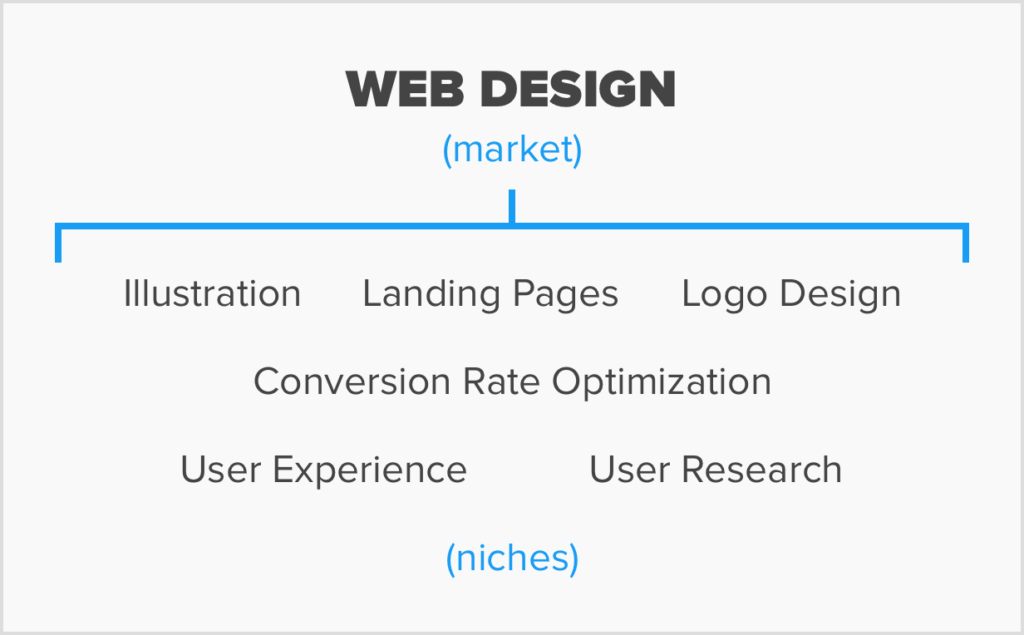To start freelancing, the very first thing you need to do is choose a freelance niche.
But if you’re like I was when I started, you probably have questions: “What’s a freelance niche? Why do I need one? Can’t I just wing it?”
This article answers those questions and explains why choosing a freelance niche is the most important decision of your freelancing business.
What’s a Freelance Niche?
In business, a niche is a specialized or focused area of a broader market that businesses can serve to differentiate themselves from the competition.
Simply put, choosing a niche means choosing which services you will offer to clients and which services you won’t.

If you’re a web developer, for example, will you design and build custom applications? What about themes and plugins for popular content management systems like WordPress and Shopify?
Are there specific services under those buckets you’ll choose to focus on? Are there some you deliberately won’t offer?
Why You Need a Niche
If you’re wondering why you need to make this choice, you’re not alone.
Many freelancers try to offer their clients whatever they ask for, reasoning that this approach is most likely to result in the most sales. But offering every service actually decreases sales and profits.
Why? In a word, marketing.
Growing your freelance business—by closing more sales and charging more—is much easier when you specialize:
- Specialists Close More Sales – Clients trust specialists more than generalists, particularly with their most important projects. Being a specialist conveys authority and confidence, which makes closing sales much easier.
- Specialists Charge More – Clients believe that specialists have expertise and skills that generalists don’t. This means that by positioning yourself as a specialist, regardless of your actual skills, you can charge more.
- Specialists Get More Referrals – Referring a freelancer is always a risk, because your reputation is on the line. So people only make referrals when they’re confident the freelancer they’re referring will reflect well on them. Specialists have a clear edge here because of their perceived expertise, so they get more referrals than generalists.
How much does this really matter?
Well, let’s take a look at the average income for a generalist web designer in Boston:

Now, let’s compare that to a specialist role like a User Experience Design:

As you can see, design specialists make significantly more than generalists. According to PayScale, specialists earn nearly double generalists! This is true across every role and every industry.
So please, do yourself a favor and pick a niche!
What Makes a Good Freelance Niche?
Great! We’ve covered what a niche is and why you need one. But what, exactly, makes a good freelance niche?
Well, the best niches have a few things in common:
1. Good Niches Match Your Interests & Talents
First and foremost, you need to love whatever niche you pick.
Perseverance is the key to any successful business venture, and passion naturally drives perseverance. If you’re not naturally passionate and curious about your niche, it’s going to make it particularly challenging to keep going once things get tough.

2. Good Niches Have High Demand
In an ideal world, you’d pick a niche that has so much demand that you had a line of clients winding down the street waiting to work with you.
Obviously, this ideal world doesn’t exist, but it’s important to ensure that you’re not picking something nobody wants. Good niches have enough demand that they can sustain your business.
3. Good Niches Have Low Competition
If you broaden your niche, you might increase demand, but you’ll definitely increase competition.
A crowded, comeditized niche means that prices go down and that it’s harder to close sales.
Pro Tip #1: Start Broad – When in doubt, err on the side of a broader niche, rather than a narrower one. You can always niche down further later once you learn what’s working best.
Common Niche Patterns
There are a few different ways to pick a niche, but the most common approaches are these:
- Picking a Horizontal (What) Niche – Picking a niche that focuses on a particular skill or technology is a popular approach. Developers who focus solely on WordPress have chosen a What-based niche.
- Picking a Vertical (Who) Niche – Picking a niche that focuses on who your clients are is also common. Programmers who focus on a particular industry, say e-commerce, have chosen a Who-based niche.
Pro Tip #2: Use Caution When Niching Vertically – Vertical niches can be challenging to build expertise in, and it’s often easy to get bored when 90%+ of your work comes from the same types of clients. When in doubt, choose a horizontal, skill-based niche instead.
While you can combine both of these approaches to get an ultra-focused niche, I recommend picking one of these approaches as a beginner.
How to Find Freelance Niche Ideas
If you’ve already got 3-5 niche ideas, great! I’ll meet you in the next article, where we’ll validate your niche.
But if you don’t have any ideas yet, here’s a quick way to find some:
- Search Freelance Job Boards – One easy way to get freelance niche ideas is to search freelance job boards like UpWork or Freelancer.com. If you see the same job posted again and again, and if it has a high price, it’s probably a good niche!
Brainstorm 3 to 5 niches, and I’ll see you in the next article, where we’ll focus on how to find clients!

Leave a Reply